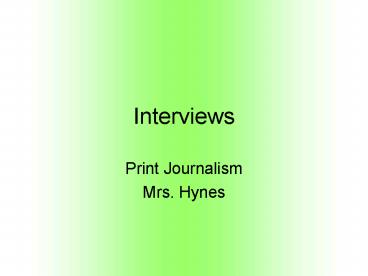Interviews - PowerPoint PPT Presentation
1 / 17
Title:
Interviews
Description:
If the reporter is using the exact words that a person said, then the quote ... If you don't get the complete answer, ask politely to repeat. Step 8: Close ... – PowerPoint PPT presentation
Number of Views:45
Avg rating:3.0/5.0
Title: Interviews
1
Interviews
- Print Journalism
- Mrs. Hynes
2
Interviews
- An interview is a way for a reporter to get
information directly from a source. - If the reporter is using the exact words that a
person said, then the quote should be in
quotation marks. - If the reporter is not using the EXACT words of
the source, then a reporter may paraphrase, but
still credit the source with the information. - To paraphrase, the meaning must remain the same,
even though the words used are different. A
reporter must be careful not to alter the meaning
or they may present biased reporting.
3
For example
- Interviewer asks question Where were you born?
- Person being interviewed answers I was born in
southern California, Orange County. Long Beach to
be specific. - Example of Direct Quote Longoria stated that she
was, born in southern California, Orange
County. - Example of Paraphrasing Longoria later confirmed
the city of her birth to be Long Beach,
California. - See the difference?
4
Punctuation of Quotations
- The quote is enclosed in quotation marks.
- The quote is separated from the rest of the
sentence using a comma. - The comma or period at the end of the quote goes
INSIDE the quotation marks. - Examples
- Pam said, I love to cook pies for Holidays.
- I love to cook pies for Holidays, said Pam.
5
Types of Interviews
- Press Conference In this type of interview, many
reporters gather in one place to interview an
important person. They must take turns being
called upon to ask a question. All the reporters
record the information and may use it for their
stories. - This type of interview is controlled by the
person giving the interview. They decide when it
is over and which questions they will answer.
6
2 Kinds of Interviews
- One-on-one This kind of interview is requested
by the reporter with another person. - It may be an on-the-spot interview with a witness
at a news scene in which the reporter tries to
glean information about the event. - Or it may be a pre-planned interview in which the
reporter specially requests an interview with a
person and has time to prepare questions ahead of
time. - Interviews may be used for News stories or
Feature stories.
7
Guidelines For Interviews
- Print Journalism
- Mrs. Hynes
8
Step 1 Arrange
- Make an appointment in advance.
- Set the time, date, and place for the interview
(consider noise levels, comfort and privacy). - Explain the purpose of the interview and give an
- estimated length of time.
9
Step 2 Research
- Do your homework! Research the person you will be
interviewing. - Prepare yourself to ask intelligent, educated
questions and avoid rehashing information that is
already common knowledge about the person.
10
Step 3 Prepare
- Write your questions ahead of time.
- Ask open-ended questions that require an
explanationnot yes or no questions. - Add additional questions that may seem important.
- Use the 5Ws and How.
11
Step 4 Practice
- Practice reciting the interview out loud before
the real interview. - This way you can check for any errors ahead of
time. - Sound professional!
12
Step 5 Impress
- For the interview arrive early, get organized,
and dress appropriately. - Greet your interviewee warmly and courteously.
Thank them for coming! - Set your interviewee at ease by starting with
some small talk before the interview. - Be sure to ask permission if you are going to
record the interview.
13
Step 6Be thorough
Could you explain that a little further, please?
Could you repeat that please? Im not sure I
heard you correctly.
- Clarify their official title, name and spelling.
- Jot down a physical description of person.
- Ask your questions one at a time, giving plenty
of time for an answer. - Speak slowly and clearly.
- Use eye contact when speaking to the interviewee.
- Dont be afraid to ask for clarification or
further explanation of their answer.
14
Step 7 Be accurate
- Take accurate notes!
- You must write down exactly what the interviewee
is saying. - You cannot add or make up things.
- If you dont get the complete answer, ask
politely to repeat.
15
Step 8 Close
- Be sure to thank the person for their time, smile
and shake their hand when you finish the
interview. - Transcribe (type up) your interview notes soon
after the interview or you will forget what your
notes mean!
16
Steps for a good interview
- 1. Arrange
- 2. Research
- 3. Prepare
- 4. Practice
- 5. Impress
- 6. Be thorough
- 7. Be accurate
- 8. Close
17
Final Projectfor Print Journalism!!
- You will be assigned to write a story about one
of your classmates. - Day One (Today-HW) Prepare 21 open ended
interview questions and practice reading them
aloud. - Day Two Interview or be interviewed.
- HW Write your story.
- Day Three Type story, peer edit revise.
- Day Four Design layout.































